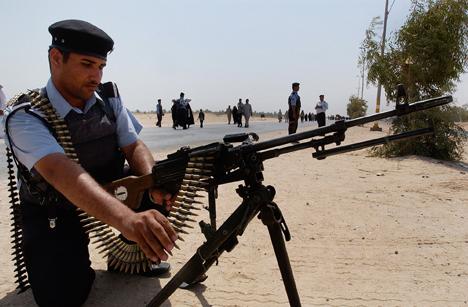Iraq to formally acquire control of armed forces

Khalid Mohammed The Associated Press The Associated Press
Sep 7, 2006
Last updated on May 12, 2016 at 04:19 a.m.
BAGHDAD, Iraq – Iraq will take control of its armed forces command on Thursday, a major step on its painful path toward independence and an essential move before international troops can eventually withdraw.
Despite the progress, there was more bloodshed with at least 36 people killed across the country in car bombs, mortar attacks and drive-by shootings. Police also found 29 bodies.
“This is such a huge, significant event that’s about to occur tomorrow,” U.S. military spokesman Maj. Gen. William Caldwell said of the shift in the Iraqi command. “If you go back and you map out significant events that have occurred in this government’s formation in taking control of the country, tomorrow is gigantic.”
The highly anticipated ceremony, which will put the prime minister in direct control of the military, comes five days after it was originally scheduled. The government abruptly called off the original ceremony at the last minute.
Get The Daily Illini in your inbox!
The U.S. and the Iraqis did not publicly reveal many details of the disagreement, other than to say it was mostly a formality.
Caldwell said the handover was so important, it could not be rushed into.
“If there’s even a question, if there’s even a slightest misunderstanding, you would absolutely want to get that thoroughly resolved,” he said.
Following the fall of Baghdad in April 2003, the U.S. disbanded what was left of the defeated Iraqi army. The U.S.-led coalition has been training and equipping the new Iraqi military, hoping it soon will be in a position to take over security for the entire country and allow foreign troops to return home.
But it is still unclear how fast this can be done.
“It’s the prime minister’s decision how rapidly he wants to move along with assuming control,” Caldwell said. In Thursday’s ceremony, the prime minister will take control of Iraq’s small naval and air forces, and the 8th Iraqi Army Division.
“They can move as rapidly thereafter as they want. I know, conceptually, they’ve talked about perhaps two divisions a month,” Caldwell said.
The 8th Division was recently engaged in a fierce, 12-hour battle with Shiite militia in the southern city of Diwaniyah which left more than 20 soldiers and 50 militiamen dead.
Days before the battle, the Division’s commander, Brig. Gen. Othman al-Farhoud, told The Associated Press that while his forces were capable of controlling security, they still needed support from the U.S.-led coalition.
He said there was still a need for coalition air support, medical assistance and military storage facilities.
“In my opinion, it will take time,” al-Farhoud said when asked how long it would take before his division was completely self-sufficient.
Iraqi President Jalal Talabani projected in a Tuesday meeting with visiting British Foreign Secretary Margaret Beckett that fighting in Iraq will have abated by the end of 2007, and that Iraqi forces will be able to handle any remaining violence. Yet the killing continued. On Wednesday, two bombs targeting an Iraqi army patrol exploded in Baghdad within minutes at a busy intersection, killing at least nine people and wounding 39, police said. Elsewhere, gunmen opened fire on a procession of religious pilgrims, wounding two.





